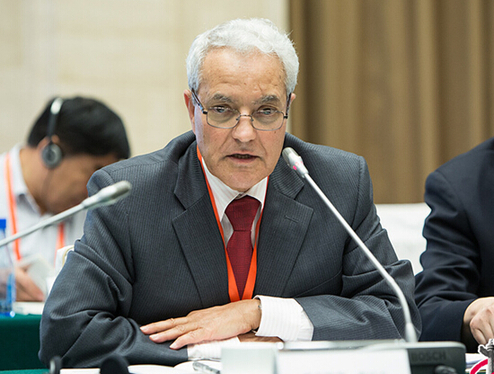Paper abstracts: Mohamed Noman Galal
 0 Comment(s)
0 Comment(s) Print
Print E-mail China.org.cn, June 27, 2014
E-mail China.org.cn, June 27, 2014
Mohamed Noman Galal
Mohamed Noman Galal

(Senior Egyptian Diplomat and Author)
Author
Dr. Mohamed Noman Galal is a senior Egyptian diplomat and author. His appointments have included serving as Egyptian Ambassador to China (1998-2001), Pakistan, India and the Arab League. He served as Assistant Foreign Minister for Policy Planning (2001-2002). He was also honorary advisor for Shanghai Institute for International Studies (2003-2012). In addition, Dr. Galal has written over 40 books since 1974 on topics spanning political history, international relations and Islam.
Abstract
The paper deals with the initiative of the Silk Road Economic Belt in a historical perspective to anticipate to prospects of the new initiative on the Arab-China relations. The initiative takes China’s integration with the world as an integral part of its comprehensive approach particularly to Central Asia, South Asia and West Asia as well as to Europe and Africa. The ancient Silk Road carried trade, particularly the silk, from China to the world and get in return goods from Central Asia, South Asia and Middle East to China. It was also influenced by the South and Middle East cultures and religions such as Buddhism, Islam and Christianity. Today in a world full of wars and civil strife, the new initiative will be a candle to enlighten the road to peaceful and harmonious world through emphasizing on trade, investment and culture dialogue rather than conflict and struggle. Arabic-Chinese relations in the past were based on bilateral contacts. Then the concept of multilateral was introduced through adopting the Arabic-Chinese Cooperation Forum which has achieved great success. China is contributing immensely to the economic development of the Arab world and Africa. It also secures access to oil, gas and natural resources needed for its industrial development. It also benefits from the vast markets in the Middle East and Africa. All these are built on concepts and principles of common interests and mutual benefits. It is a win-win deal. Traditionally China is not a colonial power and if history is a guide for the future, it will not be a colonial power in the future. I anticipate that the Silk Road Economic Belt will contribute in an innovative way to developing China and the world at the same time. China and Arab countries have all the factors to achieve an outstanding economic development through beneficial cooperation as they have human resources, vast markets, and natural recourses. All they need is an innovative approach which the belt and the road initiative could be instrumental in this regard. The Arab countries are in an unrest stage of development, needing Chinese support and help. China needs the Arab gas and oil as well as Arabic financial recourses and Arabic market. They could complement each other in any industrial or other projects from which both sides will benefit. The paper will deal in details with the following topics: – Silk Road role in the past. – Silk Road and challenges of today’s world. – Belt and Road impact on Chinese regional and international relations. – Belt and Road initiative impacts on Sino-Arabic relations in 21st century. The paper concludes that the initiative is a great innovation in building peaceful and beneficial relations between China and the world, particularly with the Middle East. It highlights that China in the past was keen on trade not expansion as it happened with European imperialism. China in the future will continue in building a world civilization through dialogue, trade and investment. This will consolidate globalization, thus a harmonious world could be built through soft power rather than hard power.
Muratbek Imanaliyev






Go to Forum >>0 Comment(s)